EGYPT - The Coptic Evangelical Organization for Social Services (CEOSS)
Supporting Girls Education
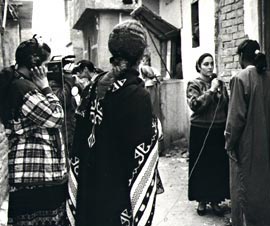 The videotape
"Girl's Education" features interviews with diverse community members in the Upper Egypt
village of Beni Ghani: young girls, mother, fathers, a sheikh, a school principal and a Coptic priest.
The sheikh quotes extensively from the Qu'ran and Hadith regarding the vital importance of education and
equal rights for girls and women. One woman with three daughters advises that mothers should do
housework on their own so as to enable their daughters to attend school. A man with four daughters tells
of having sent them all to school in spite of the criticism of others. He explains, "We have no
money to give them; education is their legacy… Nowadays," he adds, "girls can do anything - be
doctors, lawyers…" A girl who initially attended literacy classes and is now in regular school
says, "I used to feel less than my peers, but now I have a certificate and I can do whatever I want
to do."
The videotape
"Girl's Education" features interviews with diverse community members in the Upper Egypt
village of Beni Ghani: young girls, mother, fathers, a sheikh, a school principal and a Coptic priest.
The sheikh quotes extensively from the Qu'ran and Hadith regarding the vital importance of education and
equal rights for girls and women. One woman with three daughters advises that mothers should do
housework on their own so as to enable their daughters to attend school. A man with four daughters tells
of having sent them all to school in spite of the criticism of others. He explains, "We have no
money to give them; education is their legacy… Nowadays," he adds, "girls can do anything - be
doctors, lawyers…" A girl who initially attended literacy classes and is now in regular school
says, "I used to feel less than my peers, but now I have a certificate and I can do whatever I want
to do."
This tape was produced by a team of young women from Beni Ghani within months of their learning to use video equipment. It will be used to advocate for girls' education in a region where primary school attendance shows a gender disparity of over 14% in favor of boys.
Partner Organization Profile
The Coptic Evangelical Organization for Social Services (CEOSS) is an Egyptian non-governmental organization that provides wide-ranging community development assistance. Its social welfare-oriented approach emphasizes integrated programs and services in education, environment, health and agriculture. Volunteer-based, CEOSS fosters self-management of projects by community members.
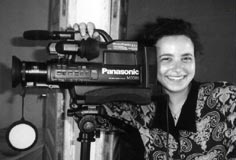 For several years,
CEOSS has implemented the "New Horizons" curriculum in communities throughout Upper Egypt and
the Cairo area. "New Horizons" is a non-formal educational program designed to provide
disadvantaged girls and young women with important life skills and reproductive health information.
Developed by the Centre for Development and Training Activities (CEDPA) in collaboration with several
Egyptian NGOs including CEOSS, the essential aim of "New Horizons" is to enable girls and
young women to make informed life choices.
For several years,
CEOSS has implemented the "New Horizons" curriculum in communities throughout Upper Egypt and
the Cairo area. "New Horizons" is a non-formal educational program designed to provide
disadvantaged girls and young women with important life skills and reproductive health information.
Developed by the Centre for Development and Training Activities (CEDPA) in collaboration with several
Egyptian NGOs including CEOSS, the essential aim of "New Horizons" is to enable girls and
young women to make informed life choices.
Project Implementation
Under the USAID-funded Partnership Projects for Girls and Young Women, CEDPA subcontracted Communication for Change to provide participatory communication training for NGO development field workers and young women in several "New Horizons" communities. The objectives of the project include:
- developing local NGOs' capacity to use participatory communication strategies to strengthen their community-level work;
- training young women to produce video programs that reflect their experience and address community concerns;
- using participatory video as an advocacy tool in support of girls' and women's empowerment.
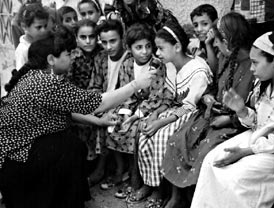 The first training
workshop for what came to be known as the "Video and Community Dreams" project took place in
early 1998. Participating were CEOSS staff, volunteers, and young women from three villages in Minya
Governorate and from Zenhom, a low-income neighborhood in Cairo. For the first time, C4C conducted
parallel trainings at three different sites, two in Minya and one in Cairo. This enabled the trainees to
develop their fledgling video skills within their own localities. All of the participants met together
for the first two days, during which discussion focused on project goals, issues of self-representation,
and on participants' hopes regarding their use of video. Everyone gathered together again for a
celebratory exchange of experience and screening of tapes at the workshop's end.
The first training
workshop for what came to be known as the "Video and Community Dreams" project took place in
early 1998. Participating were CEOSS staff, volunteers, and young women from three villages in Minya
Governorate and from Zenhom, a low-income neighborhood in Cairo. For the first time, C4C conducted
parallel trainings at three different sites, two in Minya and one in Cairo. This enabled the trainees to
develop their fledgling video skills within their own localities. All of the participants met together
for the first two days, during which discussion focused on project goals, issues of self-representation,
and on participants' hopes regarding their use of video. Everyone gathered together again for a
celebratory exchange of experience and screening of tapes at the workshop's end.
Workshop participants gained familiarity with camera functions and techniques through shooting exercises. They developed their interpersonal skills by taping both real and role-played interviews. They learned the importance of production planning and storyboarding, and of working closely as a team while filming.
By the workshop's conclusion, each team had produced sequentially-shot ("in-camera" edited) videos, and had screened them for community members. In several cases, apprehension was replaced by relief and pride when audiences expressed their admiration for the teams' work.
First Screening
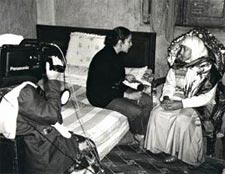 "A Woman from Zenhom" was the second tape produced by the Cairo
video team. It profiles Rawia, who works as a teacher of sign-language while also serving her
community as a volunteer literacy teacher, New Horizons facilitator, and speech therapist. The team
members wished to portray the important roles that women can play in their communities - largely
because some local opinions hold that women should not work outside the home.
"A Woman from Zenhom" was the second tape produced by the Cairo
video team. It profiles Rawia, who works as a teacher of sign-language while also serving her
community as a volunteer literacy teacher, New Horizons facilitator, and speech therapist. The team
members wished to portray the important roles that women can play in their communities - largely
because some local opinions hold that women should not work outside the home.
When the team conducted their first playback of the tape to a community audience, which included local committee members, reaction was overwhelmingly positive. Viewers admired the quality of the program, and readily identified the message that women can play a part in their community as well as be wives and mothers. Some suggested that the video could help encourage other women to work outside the home. Audience members then offered various ideas for future video programs. The lively response to - and approval of - this early effort gave the newly trained producers great satisfaction, and video team members and viewers alike seemed to a share a sense of achievement.
The approval and support of community members was essential to the project's growth. Initially somewhat nervous and self-conscious about filming in their communities, many team members spoke of the confidence they now feel in shooting, carrying out interviews with diverse individuals, and expressing their views in general.
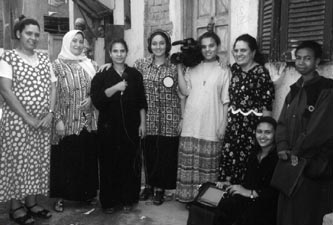 Several of the
teams' early tapes focused on topics affecting the community as a whole, such as environmental and
educational issues. Progressively, the teams took on more sensitive issues, such as early marriage and
the practice of female genital mutilation (FGM). Individual team members described themselves as bolder,
more confident, readier to speak out and to take on challenges. [Read more about speaking out against
FGM in Egypt and in Guinea.]
Several of the
teams' early tapes focused on topics affecting the community as a whole, such as environmental and
educational issues. Progressively, the teams took on more sensitive issues, such as early marriage and
the practice of female genital mutilation (FGM). Individual team members described themselves as bolder,
more confident, readier to speak out and to take on challenges. [Read more about speaking out against
FGM in Egypt and in Guinea.]
"Video and Community Dreams" programs have helped to effect change. One of the first tapes produced by the team in Beni Ghani was about a polluted canal that has become a public health threat. Opening with images of the filthy waterway, the tape features interviews with a variety of community members - children, parents, elders, the local doctor and an engineer - all of whom address the problem. The finished tape was shown to over 200 villagers. A community delegation then screened it for a key official. As a result, filling in the canal became a priority among local leaders and officials.
Other tapes have advocated for the educational and recreational needs of village children, presented medical, religious and social arguments against the practice of female genital mutilation, and decried pollution of the Nile. In addition, the teams have used video to document local development initiatives, such as the building of new schools or small loan programs that help individuals start their own businesses. Local assessments inidcated that these videotapes have been viewed not by thousands of people in the project communities.
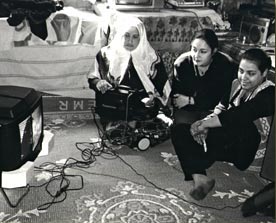 Following the
primary implementation period of the "Video and Community Dreams" project, C4C conducted a
series of field visits and short follow-up training workshops. Four additional communities joined the
project; original participants provided support and training for new team members, including girls ages
15-19. These new recruits offered many ideas for future program topics, including a woman's "right
to choose" in matters of study, work, and her partner in life. Young trainees expressed their
excitement at being involved, and particularly at the prospect of learning to use the video gear. As one
village girl put it, through this project "she can do whatever a boy could do." Another
stressed, "I am not less than a boy," and said that because of her involvement in the project
she would gain respect in her family and the community.
Following the
primary implementation period of the "Video and Community Dreams" project, C4C conducted a
series of field visits and short follow-up training workshops. Four additional communities joined the
project; original participants provided support and training for new team members, including girls ages
15-19. These new recruits offered many ideas for future program topics, including a woman's "right
to choose" in matters of study, work, and her partner in life. Young trainees expressed their
excitement at being involved, and particularly at the prospect of learning to use the video gear. As one
village girl put it, through this project "she can do whatever a boy could do." Another
stressed, "I am not less than a boy," and said that because of her involvement in the project
she would gain respect in her family and the community.
Primary implementation of the Video and Community Dreams project ended by early 2000. Outreach activities relating to the issues addressed under the initiative continued in various project communities with support from CEOSS. In Zenhom, the Cairo neighborhood that was one of the first project sites, some members of the original participatory video team founded an independent community association that included video documentation of local events and issues as one of their activities.
© Communication for Change, Inc. 2003-2019. All rights reserved.
